Our Phantom Far Right
The media and politicians talk like it's about to take over; but polling and election results keeps showing that it doesn't exist. What's going on?
A recent Politico poll of polls, synthesised by the fine Twitter account @populismupdates, put the presence of the Far Right in the Irish political system as literally zero. (Underlying data here.)
This will come as a shock to anyone who consumes Irish media and political commentary. Current coverage suggests you can barely cross O’Connell Street on a given day for the thousands of jackbooted skinheads stomping up and down, swastika flags aflutter in the breeze.
Let’s review some recent (last 18 months or so) activity in the Irish media and see if it reflects the polling:
That’s just a sample - there’s plenty more where that came from.
What explains the disconnect between the powerful image of an Irish Far Right in the minds of politicians and media, and its verifiable presence in our political system, which is nil?
The key function of the spectre of the Far Right in Irish political culture is to pre-emptively deligitimise certain topics, political nuances and courses of action which might otherwise be permissible or reasonable if it wasn’t an imminent threat.
In the long term the number one target for this approach is the subject of demographic change, it’s pace, trade-offs and long-term implications; in the short term (as in other countries) the target is the appropriateness and efficacy various measures introduced to limit freedoms in the wake of COVID.
This desire is facilitated by the emergence of a couple of sketchy, opportunist NGOs who generate data that journalists can churn into investigative articles on a regular basis, making it easier to produce this stuff. Ciaran Brennan of The Burkean has written about these groups here and here.
The revolving door between journalism and party jobs, and the availability of funding from the EU mean that it’s also a financially rewarding topic to cover.
Similar material and ideological incentives exist for Irish politicians. There is also the “what will the neighbours think” village mentality that defines any issue where an Irish politician can be exposed to negative attention from outside.
It’s not as though there’s literally nothing to worry about. Ireland has it’s share of true cranks, odd-balls and politically motivated nutters, as it always has in the past. Here as elsewhere their nuttiness is filtered through the prism of social media; here as elsewhere they have been more active than usual during COVID, occasionally behaving in a genuinely threatening or dangerous manner they should be held accountable for. Some of these people can reasonably be termed Far Right. Some you could probably term Far Left, if you were inclined to do so (no one is).
But the question is whether their existence is commensurate with the coverage, and whether it justifies the moral panic or the self-interested and self-regarding cultural circle-jerk it has initiated. Certainly nothing justifies using the spectre of the Far Right as a device to close off public access to an entire quadrant of the political compass; and if concern about the Far Right is genuine, the answer remains creating a culture that allows people to better voice the normal concerns they have about everyday issues rather than ignoring and pathologising them.







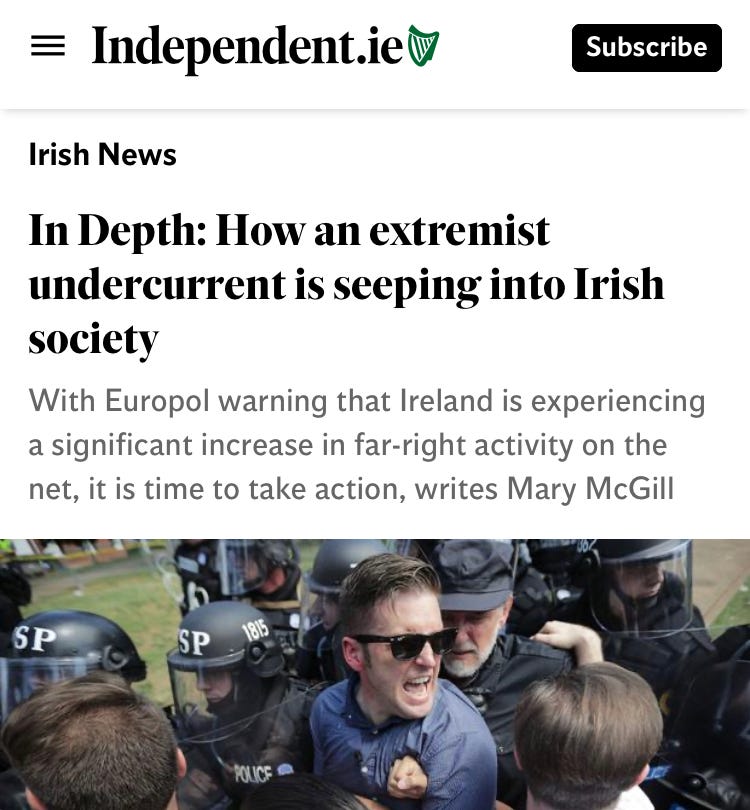
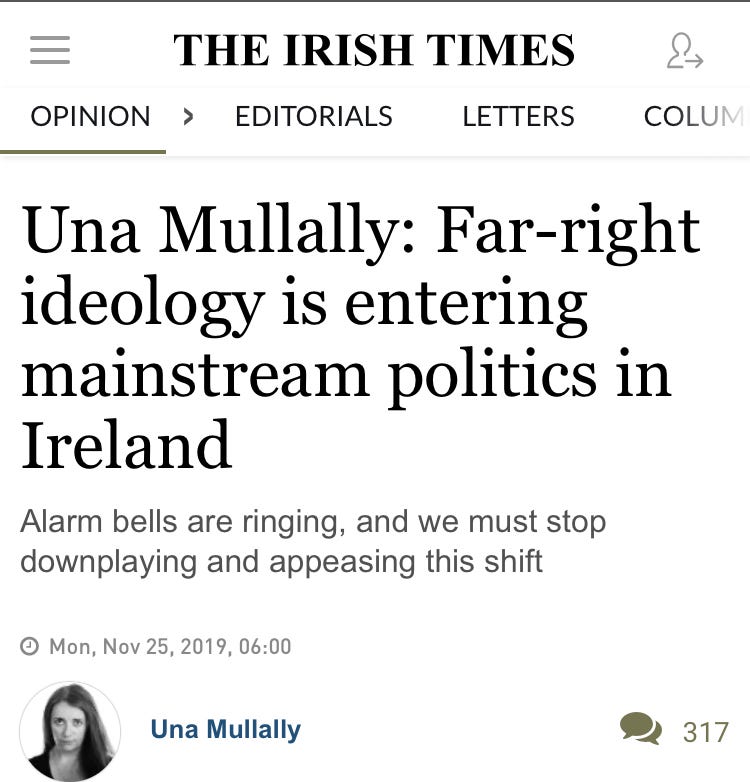
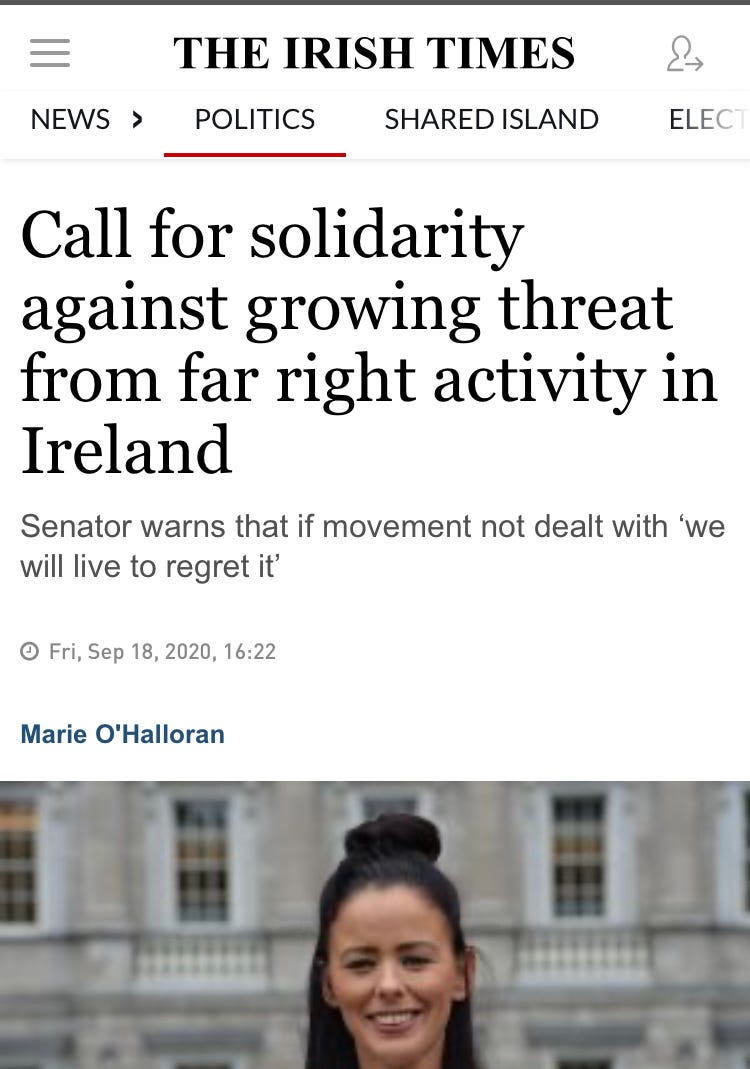

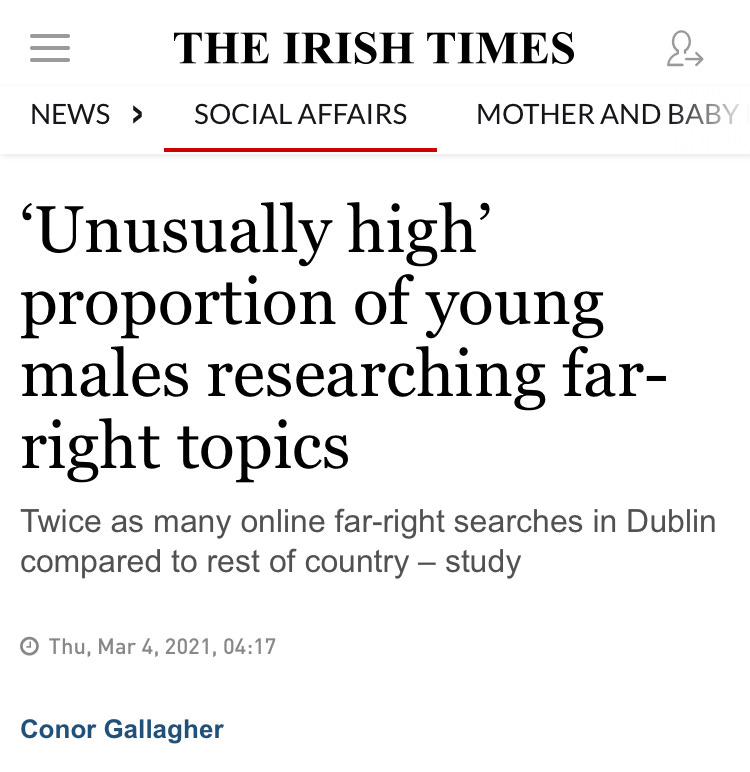
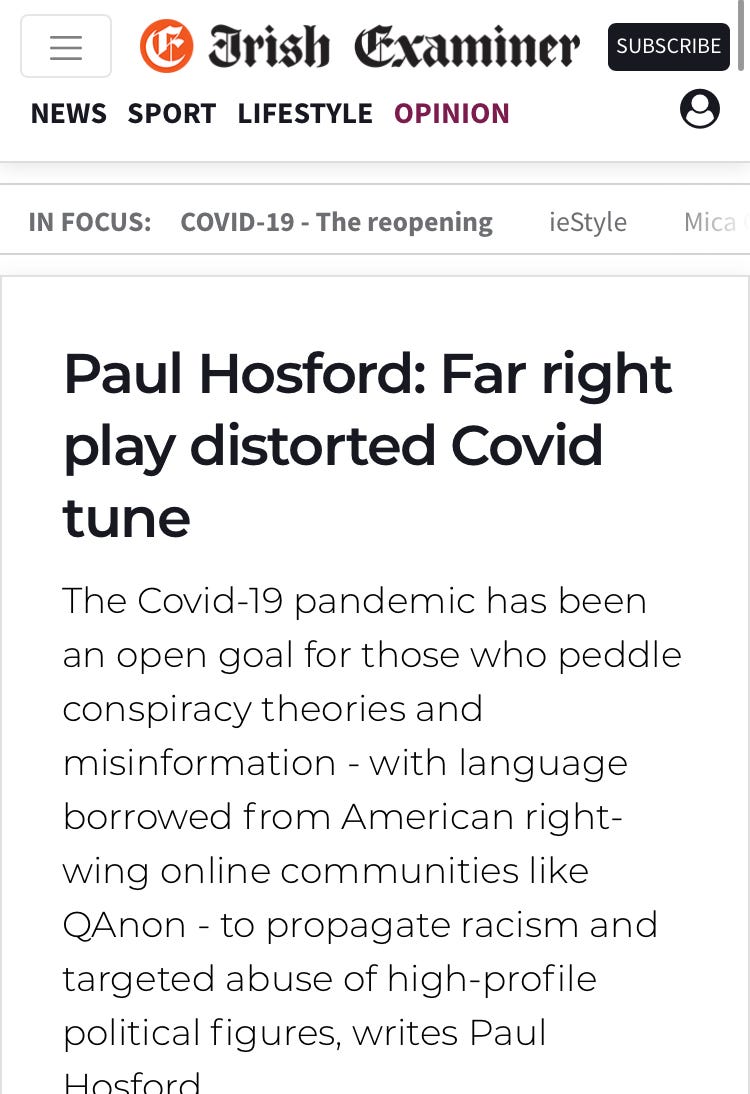
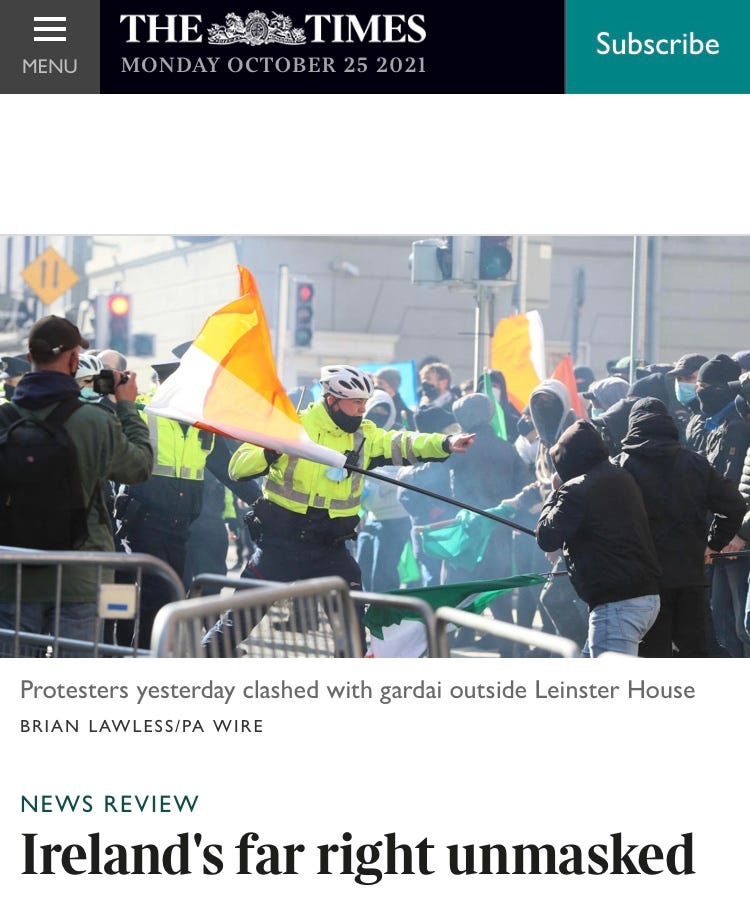
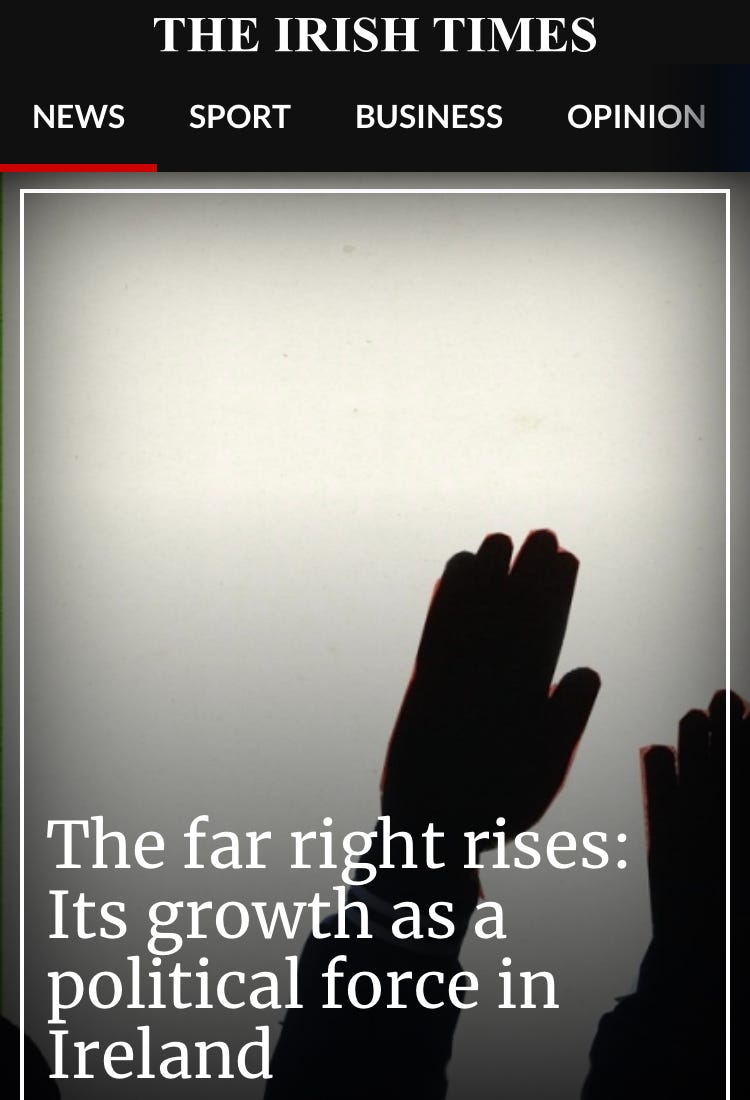
So something to note about this, where it comes from and where its going - you are right to focus in on the NGOs, as if they get their money from being "counter-extremism" and "disinformation" specialists, they really want a supply of these things to meet the demand. There is also the bizarre dynamic regarding Europe and importing foreign cultural disputes into Ireland, a sort of struggle envy. There is no Eric Zemmour or Marine Le Pen domestically, so they have to invent the spectre of the possibility - and it gets more and more ridiculous every time, hunting for the smallest possible things to make a huge deal over. Usually a backbencher or independent spouting off about taboo thoughts regarding immigration or the Travelers, usually only because events or constituents corner them into doing so to begin with. All of this can be explained by the vampiric types who run the consensus of Irish public life, their incentives and biases, in all of the institutions.
The question I have more trouble with, however, is what regular people actually think. Yes, self censorship happens, but there is an almost bizarre passivity amongst the Irish lower middle and middle class in not reacting against some of this stuff, and almost no media appetite whatsoever for opposition, with no markets identified. This is not the case in basically any other western country, where there are no institutions at all for opposition. Even Canada has a viable centre-right political party and strong regional identities that push back against the centralizing liberal project. You can blame Sinn Fein and Fianna Fail for defanging any opposition to the NGO consensus, by absorbing cultural conservatives into their midst and then ignoring them, but it goes beyond that. You can blame the Church for being allowing itself to be a punching bag (its unreal what Trocaire, for example, gets up to these days). You can blame the dissident right itself for its feeble organizational muscle. But what seems most frustrating, and disturbing, is that it may very well be the case that things won't get better, that the consensus is genuinely popular (I doubt it, though), that opposition will be futile.
I'm not sure at this point where it would come from - young men, maybe, but this is very tenuous, and like all young people looking for upwards mobility, they know where status signifiers are, even if they resent it. Rural Ireland, eh, doubtful, it always has been and always will be ignored by those in power, and its identity hasn't ever led to meaningful opposition. The Sinn Fein border base? As long as leadership can pretend like the Brits are the problem, uh, no. I guess the only hope is a mugging by reality.
As always, I proclaim my general ignorance of Irish domestic politics, so please take my opinion for what it is worth (almost nil).
There is a curious analogy here to the alleged far-right 6 January "insurrection" at the US Capitol, during which exactly one person (one of the "insurrectionists" and/or "rioters") was killed by security forces. It was hardly Kent State or the '68 Democratic National Convention in Chicago. The difference is that the US mainstream media is now in lockstep *behind* the state and national security agencies, with the exception of local police forces, who are blue-collar and can be conveniently thrown under the bus.